Form Attachments B-K Attachments B-K Interview Protocol
Cognitive and Psychological Research
Attachments B-K Interview Protocol
Measuring Sensitivity
OMB: 1220-0141
Appendix B: Instrument Introduction
The following task will be administered to participants on-line. The horizontal lines indicate page breaks, for which the participant must click a button to continue to the next screen.
Introduction
Welcome!
Thanks for your interest in our research.
We'll be asking you to read a few stories that describe the way that people interact with each other. Later, we’ll ask you to answer questions about the stories. And at the end, you’ll answer a few questions about yourself.
Unlike some surveys or online tasks, we ask that you complete this task all at one time. Please begin only when you are in a quiet place where you won't be disturbed for about 20 minutes.
Please do not use your browser's back button.
This voluntary study is being collected by the Bureau of Labor Statistics under OMB No. 1220-0141. We will use the information you provide for statistical purposes only. Your participation is voluntary, and you have the right to stop at any time. This survey is being administered by Qualtrics and resides on a server outside of the BLS Domain. The BLS cannot guarantee the protection of survey responses and advises against the inclusion of sensitive personal information in any response. By proceeding with this study, you give your consent to participate in this study.
What you’ll be asked to do
On the next few pages, you will read stories in which one person interviews another for a survey. For each story, you will read a short profile about the interviewee, followed by excerpts from the interview. We are interested in how you think [the person answering the interview questions / the interviewer] would feel while [answering / asking] the different kinds of questions.
Put yourself in the shoes of [the person answering the interview questions / the interviewer] in each of the stories
Try to take on their perspective. Focus on how [the person answering the interview questions / the interviewer] would think, feel, and react while [answering / asking] each question.
Please note that all interviewers were required to read the questions exactly as written.
Please take your time when reading the stories.
Appendix C: Stories
Next, the participant will be shown a series of four scenarios with follow-up questions after each scenario. Participants will be randomly assigned to read one group of four scenarios (Survey 1 or Survey 2), as follows below. The bracketed text represents text that will be replaced by experimental group-specific text. For example, participants randomly assigned to read forgiving wording will see that lead-in text for each scenario, as shown in Appendix A.
Story 1: Wendy
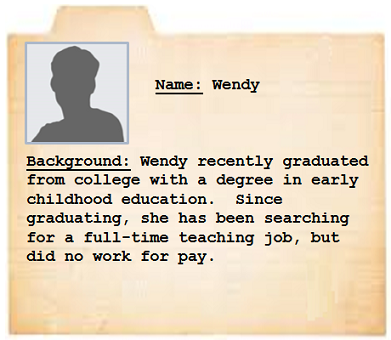
Interviewer: [Forgiving
wording, Unforgiving wording, or Neutral wording] Have you been doing
anything to find work during the last 4 weeks?
Wendy: Well,
I worked on my resume and went on 4 job interviews. I heard back from
2 of them, but I haven’t gotten an offer yet.
Interviewer: Did
you do anything else?
Wendy: No.
Finished reading the profile and the interview?
Story 2: Beth

Interviewer: [Forgiving
wording, Unforgiving wording, or Neutral wording] Have you been doing
anything to find work during the last 4 weeks?
Beth: Like
I mentioned earlier, the assembly plant was shut down. I looked for
work for over 6 weeks – it was 46 days, I counted - and have
come up with nothing so far.
Finished reading the profile and the interview?
Story 3: Charlene
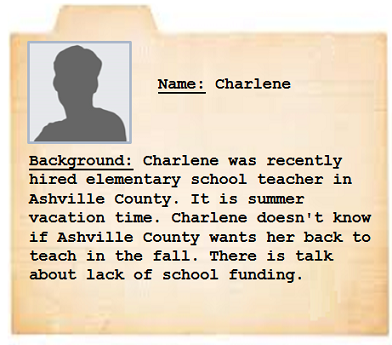
Interviewer: [Forgiving wording, Unforgiving wording, or Neutral wording] What is the main reason you were not looking for work during the last 4 weeks?
Charlene: I'm so tired of hearing: ‘Your resume is excellent but the position requires someone more up-to-date on the newest teaching methods.’ I can't help how old I am.
Interviewer: So there’s just nothing available in your line of work for someone your age, or you just couldn’t find any work, or…? –
Charlene: I looked for work for 14 straight weeks and came up with nothing. That’s more than anyone else I know. My friend John looked for only 12 weeks. I won't go through that again. There's no job out there for me.
Finished reading the profile and the interview?
Story 4: Pat
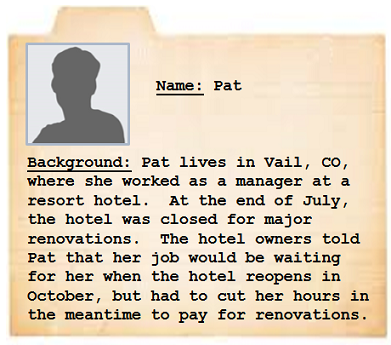
Interviewer: [Forgiving wording, Unforgiving wording, or Neutral wording] What is your main reason for working part time?
Pat: To pay for renovations, my employer cut my hours in half.
Interviewer: So is that you can only find part-time work?
Pat: [Short pause] I’ve been trying for 8 weeks, but can’t another full-time manager position at another hotel. I applied to 6 jobs. I even am looking at hotels as far as 55 miles away from home. I’m having a hard time making ends meet with so few hours.
Finished reading the profile and the interview?
Scenarios – Survey 2
Story 1: Daniel
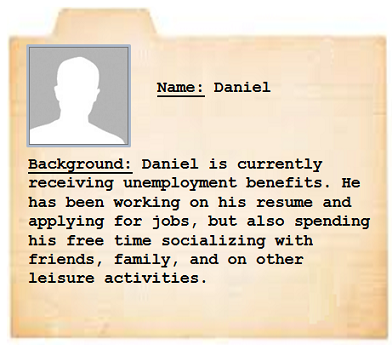
Interviewer: [Forgiving wording, Unforgiving wording, or Neutral wording] How many hours do you sleep at night on a typical weekday?
Daniel: Um…It is hard for me to estimate that, since I don’t have a regular work schedule.
Interviewer: That’s okay, just try to think of your best estimate.
Daniel: Uh, since I don’t have to wake up early to go to work… I get up at around 9:30 in the morning usually. I would say some days I sleep like 8 hours and others it is like 10 hours. On average, it’s, um… 9 hours and 15 minutes or so.
Finished reading the profile and the interview?
Story 2: Sam
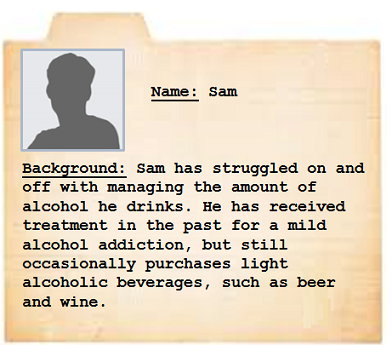
Interviewer: [Forgiving wording, Unforgiving wording, or Neutral wording] What has been your usual monthly expense for alcohol, including beer and wine to be served at home?
Sam: Hm, um, that is hard to remember an exact dollar amount.
Interviewer: Okay, just try to think back to your expenses and estimate.
Sam: I guess I usually get a 6-pack a week normally, so most months that would be… about $40.50… but during summer there have been more parties. So in August, it was… and then... $55.50 total.
Finished reading the profile and the interview?
Story 3: Alex

Interviewer: [Forgiving wording, Unforgiving wording, or Neutral wording] What is your annual rate of pay, in dollars, for your main job?
Alex: Like I said, it was recently cut, so I’d have to recalculate the amount it would be…
Interviewer: That’s okay, just try to give me your best estimate of what it would be. You can give a range if that is easier.
Alex: [Pause] I am supposed to get $46,930 but then after the cuts, I think that my salary is um, down to, $39,460. So, my annual rate for the last year would be… let’s see… $43,195.
Finished reading the profile and the interview?
Story 4: Chris

Interviewer: [Forgiving wording, Unforgiving wording, or Neutral wording] In the past 3 months, have you given any money to benefit charities or other organizations?
Chris: Um, I used to. Hard to say if I did in the past 3 months or not, after my hours got cut [Pause] Um, yes I think I did. I gave $27.45 to the Humane Society and $2 to someone on the street – does that count?
Interviewer: Um, it’s just organizations that we’re looking for. Was it for an organization?
Chris: I think so.
Interviewer: Ok, we’ll count it.
Chris: Ok.
Finished reading the profile and the interview?
Appendix D: Story follow-up questions
After each scenario, participants will be asked a series of follow-up questions about the scenario character and survey topic. The questions follow the same format for each scenario and will be presented in the same order for each scenario. Participants will only be asked about the group of four scenarios they read earlier. The questions customized for the Wendy scenario are below as an example.
Follow-up Questions for Story with Wendy
Please answer a few questions about the story you just read.
How sensitive do you think [Wendy/ the interviewer] felt while [answering / asking] this question?
Not at all sensitive
Slightly sensitive
Moderately sensitive
Very sensitive
Extremely sensitive
How personal do you think [Wendy/ the interviewer] felt while [answering / asking] this question?
Not at all personal
Slightly personal
Moderately personal
Very personal
Extremely personal
How similar are you to Wendy?
Not at all similar
Slightly similar
Moderately similar
Very similar
Extremely similar
How negatively or positively do you think most people would evaluate Wendy?
Very negatively
Somewhat negatively
Neither negatively nor positively
Somewhat positively
Very positively
How easy or difficult was it to put yourself in Wendy’s shoes when reading the scenario?
Very easy
Somewhat easy
Neither easy nor difficult
Somewhat difficult
Very difficult
How likely do you think it is that Wendy will participate in similar interviews in the future?
Not at all likely
Slightly likely
Moderately likely
Very likely
Completely likely
How happy do you think Wendy was with her decision to participate in this interview?
Not at all happy
Slightly happy
Moderately happy
Very happy
Completely happy
Appendix E: Topic-specific follow-up questions
Immediately after these follow-up questions, the participants are asked a final scenario topic-related question. The questions for each scenario are as follows below. Participants will only see the questions relevant to the scenarios that they viewed.
Wendy
Thinking about the real world now - in your opinion, how easy or difficult is the job market facing recent college graduates these days?
Very easy
Somewhat easy
Neither easy nor difficult
Somewhat difficult
Very difficult
Beth
Thinking about the real world now – in your opinion, how important would you say that manufacturing is to the health of the US economy?
Very important
Somewhat important
Neither important nor not important
Somewhat not important
Not at all important
Charlene
Thinking about the real world now – in your opinion, how easy or difficult is it for older people to find jobs these days?
Very easy
Somewhat easy
Neither easy nor difficult
Somewhat difficult
Very difficult
Pat
Thinking about the real world now – in your opinion, how important would you say it is for companies to ensure all of their employees can make ends meet?
Very important
Somewhat important
Neither important nor not important
Somewhat not important
Not at all important
Daniel
Thinking about the real world now – in your opinion, how important is it spend some time on leisure activities while unemployed?
Very important
Somewhat important
Neither important nor not important
Somewhat not important
Not at all important
Sam
Thinking about the real world now – in your opinion, how important would you say it is for someone with a mild alcohol addiction to stop drinking altogether?
Very important
Somewhat important
Neither important nor not important
Somewhat not important
Not at all important
Alex
Thinking about the real world now – in your opinion, how important would you say it is for people to disclose their annual income for an economic survey?
Very important
Somewhat important
Neither important nor not important
Somewhat not important
Not at all important
Chris
Thinking about the real world now – in your opinion, how important would you say it is for people to give money to charity?
Very important
Somewhat important
Neither important nor not important
Somewhat not important
Not at all important
Appendix F: Distractor task
After ready the four scenarios and answering the follow-up questions, the participants will be asked to complete a distractor task. The page with the distractor task will automatically advance after 30 seconds.
Distractor task
Thank
you for completing the first part of our study. You’re about
halfway through.
Next we’d like to ask you to
complete a short number game. You have 30 seconds to try to get as
many right as you can.
Two numbers will appear on the
screen, like in this example below.
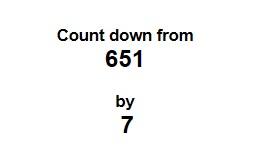
Count
backwards from the big number, by subtracting the value of the small
number.
Type
in the numbers as you go. In this example,
651 - 7 = 644, so you would first enter 644,
644 - 7 = 637, so you would then enter 637,
637 - 7 = 630, so you would then enter 630, and so on.
You have 30 seconds before the game ends.
Your 30 seconds starts now!
Count
down from
[random number between 141 and 999]
by
7
[10 text entry boxes]
Time’s up!
Appendix G: Recall questions for sensitive information
After completing the distractor task, participants will be asked questions about the four scenarios. The questions will be specific to the scenario; each scenario’s questions are as follows below. The questions about each scenario will be grouped together but the order of those questions and the order of the scenarios will be randomized for each participant. Participants will only see the questions related to the scenarios they saw earlier.
Earlier you read stories where characters answered questions about [employment / sleep habits, money spent on alcohol, charity donations, and income]. Next are questions about those stories. We are interested in seeing how much you remember about them. Even if you don’t remember the information, give it your best guess.
Wendy
Thinking about Wendy...

How many job interviews did Wendy go on?
[text entry]
How many job offers did Wendy get?
[text entry]
How many second interviews did Wendy go on?
[text entry]
Beth
Thinking about Beth...

How many days has Beth been looking for work?
[text entry box] (number validation)
How many job offers did Beth get?
[text entry box] (number validation)
How many resumes did Beth send to other manufacturing companies in the area?
[text entry box] (number validation)
Charlene
Thinking about Charlene...

How many weeks has Charlene been looking for work?
[text entry box] (number validation)
How many job offers did Charlene get?
[text entry box] (number validation)
How old is Charlene?
[text entry box] (number validation)
Pat
Thinking about Pat...

How many jobs did Pat apply to?
[text entry box] (number validation)
How many miles away is the furthest hotel that Pat applied to?
[text entry box] (number validation)
How many job fairs did Pat attend to find work?
[text entry box] (number validation)
Daniel
Thinking about Daniel...

How many hours of sleep does Daniel get on a typical weekday?
[text entry box] (number validation; hours and minutes)
What time does Daniel wake up on a typical weekday?
[text entry box] (time validation; hours and minutes)
What time does Daniel go to sleep on a typical weekend?
[text entry box] (time validation; hours and minutes)
Sam
Thinking about Sam...

How much money in total did Sam say he usually spends on alcohol every month?
[text entry box] (number validation of dollars and cents)
How much money did Sam spend on beer in August?
[text entry box] (number validation of dollars and cents)
How much money did Sam spend on beer in July?
[text entry] (numeric validation of dollars and cents)
Alex
Thinking about Alex...

How much money does Alex make?
[text entry box] (number validation)
How much money did Alex earn at his current job before his pay cut?
[text entry box] (number validation)
How much money did Alex earn at his previous construction job?
[text entry box] (number validation)
Chris
Thinking about Chris...

How
much money in total did Chris donate to the Humane Society?
[text
entry box] (number validation)
To how many organization(s) did Chris give money?
[text entry box] (number validation)
How many hours did Chris volunteer at the Humane Society?
[text entry] (numeric validation)
Appendix H: Global sensitivity questions
The participants will then be asked to answer questions about the scenarios in general.
Once again, think back to the stories you read earlier about [employment / sleep habits, money spent on alcohol, charity donations, and income]. Please think about those stories as a whole and how the characters and interviewers felt while answering the following questions.
As a whole, how sensitive do you think the characters felt while answering the questions?
Not at all sensitive
Slightly sensitive
Moderately sensitive
Very sensitive
Extremely sensitive
As a whole, how sensitive do you think the interviewers felt while asking the questions?
Not at all sensitive
Slightly sensitive
Moderately sensitive
Very sensitive
Extremely sensitive
As a whole, how honest do you think the characters were in answering the questions?
Not at all honest
Slightly honest
Moderately honest
Very honest
Extremely honest
Under which circumstance do you think the characters would be most likely to provide honest responses?
Talking to an interviewer in-person
Talking to an interviewer on the telephone
A paper-and-pencil survey sent over mail
An online survey sent over the Internet
A mobile survey sent over a Smartphone
A mobile survey sent over text-message
As a whole, how likely is it that the characters wanted to skip over, or not answer the questions?
Not at all likely
Slightly likely
Moderately likely
Very likely
Completely likely
As a whole, how likely is it that the interviewers wanted to skip over, or not have to ask the questions?
Not at all likely
Slightly likely
Moderately likely
Very likely
Completely likely
As a whole, how much regret do you think the characters felt about participating in the interviews?
No regret
Slight regret
Moderate regret
A lot of regret
Extreme regret
Appendix I: Attitude and Individual Differences
Next, the participants will be asked about their attitudes toward the survey topics.
Thank you. Now we’d like to know more about your thoughts on the story topics you read about today.
In general, how easy or difficult is it for the average American to find a job these days?
Extremely easy
Very easy
Somewhat easy
Neither easy nor difficult
Somewhat difficult
Very difficult
Extremely difficult
How long do you think it takes for the average American to find a job?
Answer in whichever unit is easiest for you:
___ days
___ weeks
___ months
[text entry number validation]
How many hours per night do you think is appropriate for most people to sleep?
[text entry number validation]
How many alcoholic beverages do you think the average American consumes in one week?
[text entry number validation]
How willing do you think the average American would be to disclose his or her income to an interviewer?
Not at all willing
Slightly willing
Moderately willing
Very willing
Completely willing
How much money do you think the average American donates to charity each year?
[text entry number validation]
Grid with all questions for the scale appearing on one page
1 2 3 4 5
(favor) (oppose)
Please tell us how strongly you favor or oppose the government asking people questions to use for federal statistics about each of the following topics…
[Row headers: employment status, sleep habits, money spent on alcohol, charitable donations, income] ?
Favor
Slightly favor
Neither favor nor oppose
Slightly oppose
Oppose
The participants will then be asked to answer questions about themselves, completing two scales. The scales will be presented in a grid format.
Now please tell us a bit about yourself. Read the following questions and choose the answer option that best describes you.
Perspective taking scale – Grid with all questions for the scale appearing on one page
1 2 3 4 5
(does not describe me well) (describes me very well)
I sometimes find it difficult to see things from the "other guy's" point of view.
I try to look at everybody's side of a disagreement before I make a decision.
I sometimes try to understand my friends better by imagining how things look from their perspective.
If I'm sure I'm right about something, I don't waste much time listening to other people's arguments.
I believe that there are two sides to every question and try to look at them both.
When I'm upset at someone, I usually try to "put myself in his shoes" for a while.
Before criticizing somebody, I try to imagine how I would feel if I were in their place.
Empathic concern scale – Grid
1 2 3 4 5
(does not describe me well) (describes me very well)
I often have tender, concerned feelings for people less fortunate than me.
Sometimes I don't feel very sorry for other people when they are having problems.
When I see someone being taken advantage of, I feel kind of protective towards them.
Other people's misfortunes do not usually disturb me a great deal.
When I see someone being treated unfairly, I sometimes don't feel very much pity for them.
I am often quite touched by things that I see happen.
I would describe myself as a pretty soft-hearted person.
Balanced Inventory of Socially Desirable Responding – 2 Grids
1 2 3 4 5
(strongly disagree) (strongly agree)
My first impressions of people usually turn out to be right.
It would be hard for me to break any of my bad habits.
I have not always been honest with myself.
I always know why I like things.
Once I’ve made up my mind, other people can seldom change my opinion.
It’s hard for me to shut off a disturbing thought.
I never regret my decisions.
I rarely appreciate criticism.
I am very confident of my judgments.
I don’t always know the reasons why I do things.
1 2 3 4 5
(strongly disagree) (strongly agree)
I sometimes tell lies if I have to.
I never cover up my mistakes.
I always obey laws, even if I am unlikely to get caught.
I have said something bad about a friend behind his or her back.
When I hear people talking privately, I avoid listening.
I have received too much change from a salesperson without telling him or her.
When I was young I sometimes stole things.
I have done things that I don’t tell other people about.
I never take things that don’t belong to me.
I don’t gossip about other people’s business.
Appendix J: Demographic Questions
How old are you? ___ [validate two digits]
What is your gender?
Male
Female
Which of the following best describes you?
Employed full time
Employed part time
Unemployed
Student
Retired
Which of the following best describes your race/ethnicity? [Check all that apply]
White/Caucasian
Black/African-American
Asian/Pacific Islander
Hispanic
Native American
Other
Which of the following best describes your highest level of education?
Less than high school
High school diploma or equivalent
Some college
Associate’s degree or Bachelor’s degree
Master’s degree or Doctoral degree
Appendix K: Thank you
The participants will be thanked for their participation.
Thank you for participating in our study.
If you have any comments you would like to share, please use the space below.
[text entry box]
| File Type | application/vnd.openxmlformats-officedocument.wordprocessingml.document |
| Author | Kincaid, Nora - BLS |
| File Modified | 0000-00-00 |
| File Created | 2021-01-31 |
© 2026 OMB.report | Privacy Policy